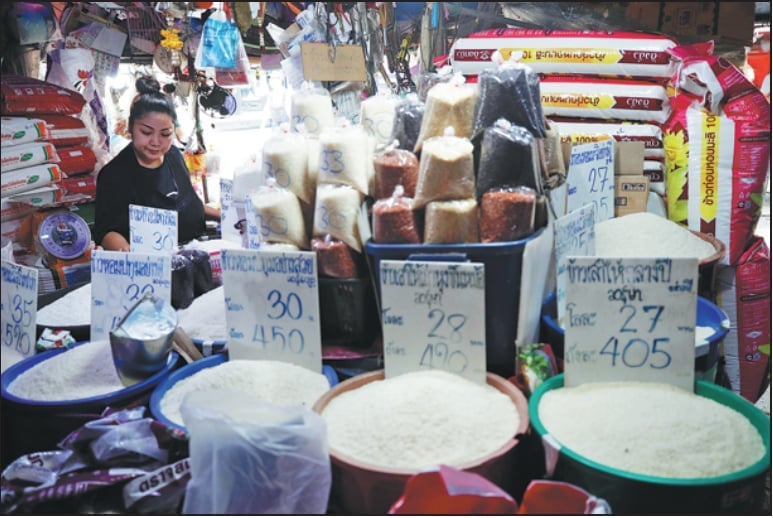December 10, 2025 | 05:20 GMT +7
December 10, 2025 | 05:20 GMT +7
Hotline: 0913.378.918
December 10, 2025 | 05:20 GMT +7
Hotline: 0913.378.918

A rice vendor waits for customers at a market in Bangkok, Thailand, on April 7. Photo: RUNGROJ YONGRIT/EPA-EFE.
"Thai jasmine rice has a high quality and reputation in the international market, which will not be shaken by the US tariff hike," said Charoen Laothamatas, president of the Thai Rice Exporters Association, or TREA. "However, the added tariff may lead to a surge in rice prices and make Thai rice prices less competitive."
Thailand is among the Southeast Asian countries hit by the US tariff measures. It faces a 36 percent tariff on goods unless negotiations are successful before the moratorium on the tariffs ends in July.
Last year, Thailand's exported 9.95 million tons of rice, a 13 percent increase year-on-year and the highest since 2018, according to TREA.Of the total exports, it sold 848,449 tons of rice to the US, making it the third-largest market for Thai rice after Indonesia and Iraq.
The Thai Ministry of Commerce has set a target of 7.5 million tons of rice exports for this year. However, according to TREA statistics, rice exports declined by 30 percent year-on-year in the first quarter of this year.
Charoen attributed the decline to several reasons, including steep tariffs from the US, a stronger baht, and higher rice prices compared with Thailand's competitors India and Vietnam.
"Specifically, India's rice is priced $40 cheaper per ton than Thailand's, prompting several countries of our main international rice consumers, including South Africa, Malaysia, and the Philippines, to turn to India instead of Thailand," Charoen said.
Declining demand, combined with increased production in both exporting and importing countries as drought conditions ease, will make Thai rice exports more challenging this year, deputy government spokesman Anukool Pruksanusak said at a recent news conference.
Chookiat Ophaswongse, honorary president of the TREA, said that rice from Vietnam is cheaper because production costs are lower, and farmers grow different crop varieties and bring in multiple harvests.
"Thai rice is more expensive as Thai farmers incur higher production costs while the yield is low. Authorities should focus on improving production efficiency of Thai farmers so they can compete in the long term, particularly by managing production costs, improving the investment and developing strains that yield higher output."
In a recent interview with Thai media, Banjong Tangchitwattanakul, president of the Thai Rice Millers Association, said the concessions Thailand is proposing to counter US moves, including bringing tariffs on US corn down from 73 percent to zero, would further hurt Thai farmers.
"Those cheap imported corn could further depress prices of broken rice and rice bran, which are extracted during rice milling and used in animal feed," he said.
Thai Prime Minister Paetongtarn Shinawatra confirmed that the US requested a postponement of bilateral trade talks regarding tariffs, citing dissatisfaction with Thailand's initial proposals. The US wanted Thailand to review and revise certain measures before negotiations could proceed, she said.
The confirmation came a day after Deputy Prime Minister and Defense Minister Phumtham Wechayachai announced on April 21 that Thailand would not buy a new fleet of F-16 fighter jets.
Thailand's major exports to the US, including electronics, electrical appliances, machinery, automobiles and parts, agriculture and processed agriculture, will be the most affected by the tariffs, said Kirida Bhaopichitr, director of the Thailand Development Research Institute's Economic Intelligence Service.
"Thailand should remain neutral and promote trade with and investments from all countries. Free trade agreements with more trading partners should be drawn up soon." Countries and businesses must diversify to survive in a fragmented global trading and investment system, she said.
Chinadaily

(VAN) Deputy Prime Minister Tran Hong Ha made this request at the 24th meeting of the National Steering Committee for Combating IUU Fishing with 21 coastal provinces and cities joining virtually.
/2025/12/03/5125-2-204704_295.jpg)
(VAN) As the province with the largest forest area nationwide, Nghe An is standing before a special opportunity to develop the forest carbon credit market.
/2025/12/02/2629-3-141849_60.jpg)
(VAN) Based on its large-scale planted forests, several rubber enterprises have proactively conducted greenhouse gas emission inventories in preparation for entering the forest carbon credit market.

(VAN) MAE is leading in developing a national rare earth strategy, which will be submitted to the competent authorities for promulgation in early 2026.
/2025/12/02/4006-4-092040_652.jpg)
(VAN) The model of converting low-efficiency rice land to aquaculture in many localities has helped increase incomes by 5 to 15 times, improve the environment, and form new fisheries economic zones.

(VAN) Funded by ACIAR, Project FST/2020/123 focuses on measures to prevent harmful alien species, thereby protecting forests from invasive threats.

(VAN) The National Assembly's Supervisory Delegation pointed out solutions for the blue economy, circular economy, environmental protection, and technology application for sustainable marine governance.